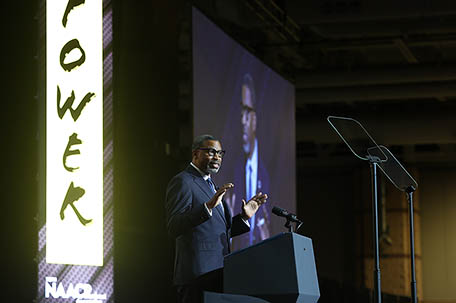
ABOVE PHOTO: NAACP president and CEO Derrick Johnson addresses the convention delegates. (Photo/NAACP)
By Amy V. Simmons
It was appropriate that the theme of this year’s NAACP National Convention — “This is Power” — emphasized the feeling of empowerment that many delegates were feeling after several years apart and the determination to move forward.
The occasion also marked the convention’s return to Atlantic City for the first time since 1955.
Members of the NAACP national board of directors, foundation board members, NAACP state conference presidents, local chapter and branch presidents, youth and college leaders, and delegates attended the six-day event, which took place from July 14-20.
It felt good to be back, said Karen Boykin-Towns, vice chair of the NAACP national board of directors.
“While we were able to get the work done during the pandemic, there is something to be said about not being able to be together, to have community, to be able to have the hugs or have the fist bumps — but you can feel the energy here,” Boykin-Towns said. “What I’m most proud of is that despite the pandemic, we did continue to work and do important work. So, you know, now all roads lead to Boston — but kudos to the New Jersey team, because they did a phenomenal job under challenging circumstances.”
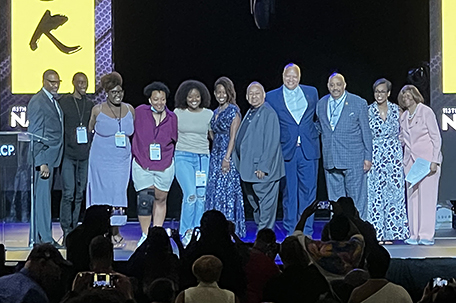
The national convention provides leadership and members with an opportunity to both reflect and set priorities for the year ahead, NAACP president and CEO Derrick Johnson said.
“Together, the NAACP has reaffirmed its commitment to unshackling our institutions from the disease of white supremacy in order to ensure true democracy so that Black Americans are able to use our collective power to move forward on key goals such as building generational wealth,” he said. “While much progress was made during our time together in Atlantic City, our work is far from over. We look forward to taking it back to our roots next July when we visit our brothers and sisters in Boston, NAACP’s first-ever local branch. All roads lead to Boston.”
In addition to the official business conducted during regional and general sessions, the day-to-day schedule included mass meetings, luncheons, and breakout sessions. Convention highlights also included the ACT-SO competition, author discussions in the NAACP Experience expo center, and off-site entertainment events.
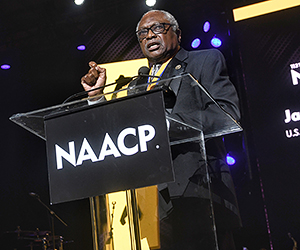
During the general legislative session held on July 19, the membership voted on several resolutions.
The NAACP Resolutions Committee takes up resolutions that propose changes or amendments to the NAACP’s policies and programs. Convention delegates normally adopt resolutions in July and submit them to the NAACP Board of Directors for ratification in October.
Among the resolutions presented at this year’s convention were those concerning environmental justice, voting rights, the U.S. policy on Haiti, police reform, critical race theory, racism as a public health crisis, as well as an emergency resolution banning all assault weapons.
Together with the California/Hawaii State Conference, the Philadelphia NAACP Branch introduced a resolution opposing discriminatory lending practices.
The resolution reaffirmed past resolutions that were similar in focus, such as “Home Appraisals and Mortgage Lending Discrimination” (2015), as well as “Rent to Own Schemes and Predatory Lending” and “Support of Regional and Municipal Public Banking”(2019).
In the 2022 resolution, a demand was made for regulatory agency scrutiny and review of policies and procedures, and for an addendum to the Home Mortgage Disclosure Act (HMDA) urging lenders to disclose data to HMDA and comply with requirements under the Community Reinvestment Act in order to improve equitable outcomes. There was also a call to develop a partnership to create Financial Freedom Centers to provide financial education and combat racial discrimination in mortgage lending, among other services.
At the closing plenary session on July 20, three short films by Black filmmakers were screened as part of the Cinematic Shorts Competition.
Afterward, convention delegates were asked to vote for their favorite entry. The filmmaker with the most votes would win tickets and free travel to the 2023 NAACP Image Awards in Hollywood.
However, the delegates were so impressed with each filmmaker’s entry that they began chanting, “Send them all!”.
Soon after, NAACP National President Derrick Johnson announced that all three filmmakers would attend the Image Awards, prompting the crowd to loudly chant this year’s convention theme, “This is Power” in response to the unexpected decision.
The films and filmmakers are: “Strike a Match” by Asia E. Marche and Mackenzie Foy,
“Say Your Grace” by Bree Webber and “#Through Our Lens” by Timothy Richardson and Shiko Njoroge.
There was also an enlightening panel discussion titled “We Must Dismantle White Supremacy” featuring NAACP president and CEO, Derrick Johnson; Rev. Marshall Mitchell, pastor, Salem Baptist Church in Jenkintown, Pa.; L. Joy Williams, president, Brooklyn Branch of the NAACP, and Tim Wise, author, and activist.
Kyle Bowser, senior vice president of the NAACP’s Hollywood Bureau, served as moderator.
At the core of the discussion was the need to address the systemic, entrenched nature of white supremacy.
This goes far beyond social media virtue signaling and reactionary measures, Wise said in his opening remarks.
“If the focus is all about calling folks out on Twitter, [if] that’s the sort of end goal of your activism, or attacking somebody on Facebook because they said something in a way that you didn’t like, rather than talking about the systems and the structures that produce that dysfunction, [or] the schools that produce spaces that produce that dysfunction, I think that’s not going to get us very far,” he said. “In fact, that’s what leads to the kind of backlash that we have right now. We have states that are prohibiting the conversation around racism, because it makes white people feel bad.”
Our approach to white supremacy must be unapologetically Black when addressing its origins and evolution, Johnson said.
“The definition of who was white in 1920 isn’t the same definition today,” Johnson said. “In fact, there are many ethnic groups who, in 1920 and 1909, when it was created, none of them were considered white, because they were not white Anglo-Saxon Protestants.
As democracy dictated [that] more people to agree on this concept of white supremacy, they began to invite more people into the class of whiteness.”
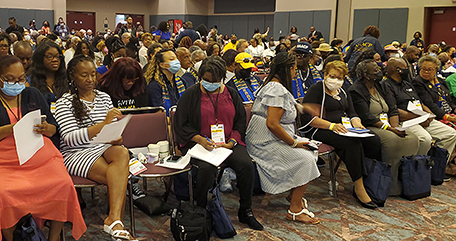
When you understand that privileged class notion of white supremacy, you realize that Black people are never going to be a part of it, so we must continue to advocate for Black and other disenfranchised communities, Johnson said.
In addition to addressing white supremacy through public policy, Johnson said the corporate sector also needs to play a role.
“It is not enough to have a soup kitchen because people are hungry,” Johnson said. “You have to [ask] ‘why are people hungry?’ and fix that problem.”
Marshall said that the Black church, which has traditionally functioned collectively as a wheel within a wheel, needs to get back to its powerful activist roots when it comes down to dismantling white supremacy.
“I know that there are 35,000 Black churches across the country that should be involved in subversion and probably have a few less revivals,” he said.
There was a discussion of how this activist, solutions-based infrastructure has worked within the dominant culture over the years in different ways — such as the Black Panther Party’s free breakfast and community education programs during the 1960s. There was an emphasis on revisiting previous solutions or implementing new ones.
During the discussion, a lively exchange took place regarding how the coronavirus pandemic has affected the nation, as well as the role that white privilege and supremacist ideas have played in the handling of it and other public health crises.
Williams decided that it was time to land the rhetorical plane.
“Saving white people is not my ministry,” she said. “Part of that white supremacy surge is also us thinking about how to convert or fix them, or how to bring them to the table so that they’ll be less mean or less directive to us. And that’s not power, because you’re still thinking about your oppressor.”
It’s not about being singling out individual people who are out there doing the work, or being mean, Williams said. It’s about prioritizing ourselves.
“When we go in Brooklyn, New York, when we go to legislators, when we go to the governor, we’re not asking for a favor to improve our lives and our community. We are going in with all of the power that we know we have to demand what is ours, and what our community needs.”
On the final evening of the convention, House Majority Whip James Clyburn was presented with the NAACP’s Spingarn Medal. The Spingarn is awarded annually by the NAACP to acknowledge the highest or noblest achievement by a living African American.
Clyburn was joined by members of the Congressional Black Caucus and received a congratulatory call afterward from President Joe Biden the following day. A large part of Biden’s victory in the 2020 presidential race was due to the influence Clyburn had on the race.
The convention was an overall success, reinvigorating the organization’s mission.
“The National NAACP Convention is important to each branch,” said Catherine Hicks, president, Philadelphia NAACP. It gives us an opportunity to come together, not only to see each other in person and place names with faces, but to bring the “Call to Action” and the resolutions we voted on back to our respective communities
and NAACP branches.The theme was “This is Power” — every meeting, workshop, luncheon, awards ceremony and social event throughout the week made that theme evident.”
Boykin-Towns felt the same way.
“I think the main takeaway is that we are power — we have the power,” she said. “This is power, where we are able to convene, and speak to the issues that are most important to our communities and align
ourselves with the resources and the information that we need to now go back across the breadth of this nation, and activate. That’s it to me.”




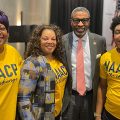
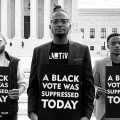
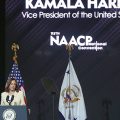









Leave a Comment